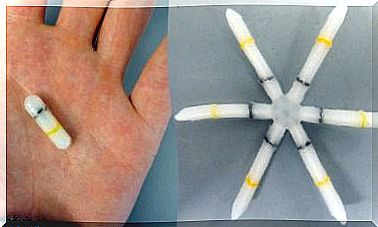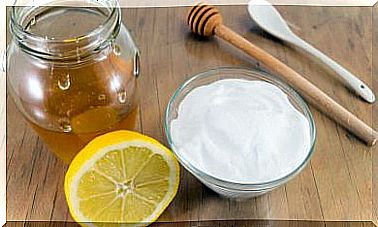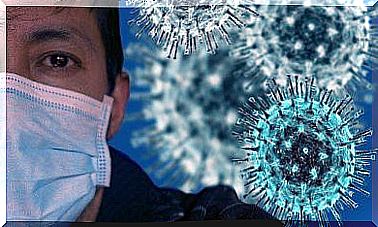Prevention Of Pneumonia: 6 Helpful Tips
Pneumonia can develop as a result of another illness such as flu and develops differently depending on the general health of the patient. Today we explain to you which preventive measures are important.

Pneumonia is an acute or chronic inflammation of the alveoli or tissue of the lungs, which can occur, for example, as a result of the flu or cold. Anyone can get it, but babies and the elderly are more at risk. That is why in today’s post we present you with helpful tips for prevention of pneumonia.
Different strategies are very important in prevention. There are two vaccinations that reduce the risk and are therefore especially important for people in the risk group. But other preventive measures can also protect against pneumonia. Read on to learn more about it.
6 tips to prevent pneumonia
Pneumonia is not contagious, although in most cases it is caused by a respiratory infection. It can be caused by viruses, bacteria, or other microorganisms, but in most cases it is bacterial, more rarely viruses or fungi.
Various preventive measures are essential to prevent this disease.
1. Vaccination against pneumonia

Two types of vaccine are currently available to help prevent pneumonia: the 13-valent pneumococcal conjugate vaccine Prevenar 13 ® and the 23-valent pneumococcal polysaccharide vaccine Pneumovax 23 ® . However, both vaccinations can reduce the risk of illness, but not prevent it entirely.
The pneumococcal conjugate vaccine protects children and adults from 13 different types of bacteria. In Germany, all infants are generally immunized. Even people with a weakened immune system recommends this vaccination, regardless of their age.
The pneumococcal polysaccharide vaccine protects against 23 types of bacteria but is not recommended for children. It is used in adults over the age of 65 who have already received the other vaccination.
Attention:
- In certain cases vaccination against pneumonia is not advisable. This is the case, for example, with allergies to the ingredients, pregnant women or people who suffer acutely from a severe cold or flu.
- On the other hand, both vaccinations can cause side effects, for example: redness and pain at the injection site, muscle pain, moderate fever and colds.
2. Prevention by giving up tobacco
It is well known that smoking has many harmful effects on health and is one of the main causes of chronic respiratory problems. Because of this, smokers are more at risk of developing pneumonia. In the event of a respiratory tract infection, you should absolutely refrain from smoking. The best thing, of course, is to put an end to this vice for good.
3. Frequent hand washing as a preventive measure against pneumonia

Correct and frequent hand washing is essential to prevent various diseases. Viruses, bacteria and other pathogens accumulate on various surfaces and often get into the airways when the hands come into contact with the mouth, nose or eyes. There they can cause serious infections.
For this reason, a preventative measure as simple as hand washing can be very important. It is best to use water and antibacterial soap for this. You should do this especially before and after using the toilet, before eating, and whenever your hands may come into contact with your mouth.
4. Avoid contact with sick people
As mentioned earlier, pneumonia itself is not contagious. But you could become infected with a disease that can lead to pneumonia. So if a family member or friend has an infectious disease, avoid contact as much as possible and be very careful. Use a mask and gloves or keep a safe distance.
5. Get enough sleep as a preventive measure against pneumonia

Getting enough sleep is essential in treating any illness associated with a weakened immune system. During the rest period, fundamental mechanisms become active that are very important in the fight against viruses and bacteria.
So to prevent pneumonia, you should recover sufficiently, especially if you have a respiratory infection. Do you suffer from insomnia? Then try these tips:
- Meditate before going to bed.
- Set up your bedroom accordingly for a good night’s sleep.
- Have a calming tea (such as valerian) before you go to bed.
- Read a book or listen to relaxing music.
6. Eat a healthy diet to prevent pneumonia
Diet is essential for a strong immune system. Include foods rich in vitamins A, B, C, and E in your eating plan. Minerals such as potassium, iron and calcium are also important in order to strengthen the body’s defenses and thus keep diseases away or recover more quickly.
If you have a respiratory disease and want to prevent pneumonia, these foods should not be missing from your diet:
- Citrus fruits
- Berries and red fruits
- Pears and apples
- Bananas
- Leafy vegetables
- Carrots
- tomatoes
- Oily fish
- Lean meat
- Dried fruits and seeds
- legumes
- Whole grain cereals
Remember that pneumonia is a serious complication of a respiratory infection. If you recognize possible symptoms, you should definitely see a doctor! The sooner you are treated, the better the prognosis.









